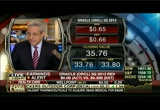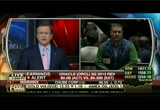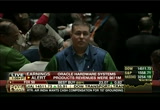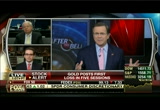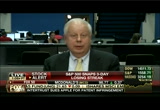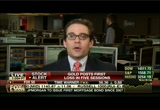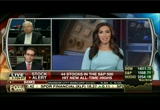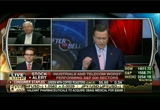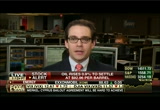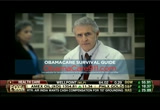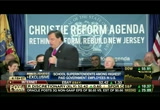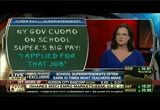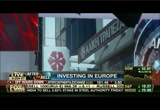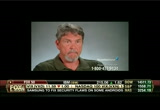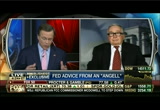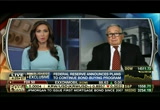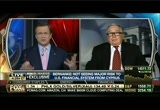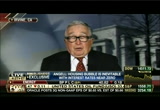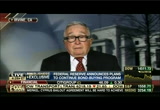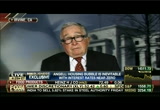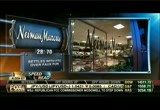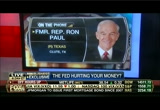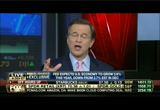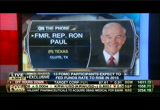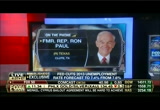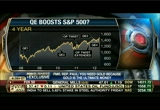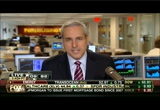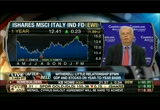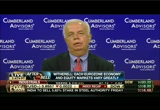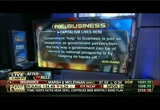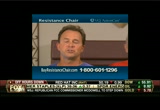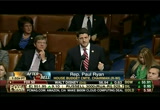tv FOX Business After the Bell FOX Business March 20, 2013 4:00pm-5:00pm EDT
4:00 pm
>> well the dow getting within one point of a new record close but pulling back, excuse me, within the last seven minutes or so of trading. we're up 49 points. 14,505. still a positive close for the dow. i want to show you stocks hitting new all time highs. nicole was talking about this a few moments ago. a little bit of a consumer shift. johnson & johnson is one of the names. that stock up .71%. travelers, united technologies and chevron, one. energy names. this is why oil prices were kind of flat. chevron up 85 cents. parker hannifin at a new high. so close with the dow. but we're up to 14 house, 507. lauren simonetti and david asman through the next hour
4:01 pm
david: very interesting, cheryl. good to see you lauren. lauren: hi. david: we have wayne angell. we have ron paul. of course his encounters with ben bernanke were legendary, historic. we'll talk to them coming up very shortly. lauren: it will be hard to get answers today because the fed is stuck in this really tough positions. we have to it figure out how to jump-start the economy, not just the stock market. let's go to nicole petallides at new york stock exchange. david: let's start, nicole. we start with fedex it was an extraordinary run-up. it was in the $100 range. it pulls back quite a bit. this is the biggest pullback since 2011? >> certainly is, the biggest pull back since 2011. concerns globally and also going to cut down what they're shipping over it asia. lauren: how is oracle looking ahead of their earnings release, nicole?
4:02 pm
>> we're watching oracle closely in the tax realm. we'll see whether or not they have earnings. [closing bell rings] david: best buy up another 5%. that stock can not be denied. as you her the bells are ringing on wall street. looks like the indexes are going to keep essentially where they were before and after ben bernanke began to talk. looked like they were sliding a bit. they stopped that slide. trading this the 50 to 60-point range on the dow. the s&p is doing better percentagewise. nasdaq is doing well. russell 2000, small and mid-sized caps doing well. there are interesting company stories and sector stories as well, lauren. lauren: homebuilders are one of the sectors. among the best performers today on better-than-expected earnings from lennar. lennar as well as d.r. horton hitting new 52-week highs today. david: sort of a bellwether of the economy, what the economy is doing here and as well overseas caterpillar was the worst performer on
4:03 pm
the dow. it was only down less than 2%. it did drag down the dow from what it could have been. the company is reporting dealer sales, get this, in the asian region dropped 26% in the last three months. north america by comparison only fell 12%. big drop in purchases from asia. lauren: stronger than expected results from general mills giving a boost to the food stocks today, a slew of flames hitting life-time highs -- names. hershey, flower foods. j&j snack foods and hormel on the list. david: the markets continued their climb as the federal reserve vowed to keep the printing presses roll being but is the market the only thing really benefiting from their programs? former congressman and long-time fed critic ron paul is telling us exclusively how all this could have potentially, extremely dangerous impact on the money you have in the bank and our country in general. lauren: plus cyprus may be the on the brink of default and looking to confiscate
4:04 pm
people's money but don't let that scare you. we have someone who says europe is chock-full of opportunities and could boost your portfolio. it all starts after the bell. david: first we'll tell you what drove the markets with today's data download. stocks pushing higher follow be the fed decision to continue the bond buying program but just a little bit. the dow hit a new intraday high as all three major indices --, hold on a second. we do have earnings from adam shapiro. go ahead, adam. >> david, yeah, we've got oracle here. and it is a miss. they missed on earnings per share. 65 cents was the non-gaap earnings per share. street was expecting 66. street was expecting 9.83 billion. david? david: after-hours this stock is dropping fairly significantly. >> 5 1/2%, 5 1/2%.
4:05 pm
they have a lot of cloud computing. we've seen in the past couple days, if you don't hit the numbers on cloud computing, very often you can miss the numbers in the stock. >> they're saying, david, that they're saying new software licenses and cloud software subscription revenues were down 2%. 2.3 billion of their overall revenue. lauren: thank you so much, adam. we have joe kucih in the pits of the cme. we have all-star panel to break down oracle earnings and fed statement. former fed economist and january any capital markets chief income strategist. joe at cme. markets in positive territory all day long, hitting new highs but a rare muted reaction to the fed. so we'll start with the fed. why so muted? >> well, because i think we didn't get any change in policy. we didn't hear anything about the hawks resurrecting
4:06 pm
themselves and actually seeing some dissensions that is getting deeper. you saw the printing presses continuing and the market reacted accordingly. lauren: i saw one kang and that was this in the statement. fiscal policy is somewhat more restrictive. that is obviously reference to washington and the debt seal being sequester. what do you make a of that, jo he? >> i think more of an accommodation they will pepper light phrases in there that might get set up for the policy some day down the road is going to change. they put that language in there to get us ready. david: joe, talk specifically about a sector, the tech sector. we had a couple earnings that reflect on the tech sector. oracle is down after-hours because of its misses on some of the comments. >> right. david: what do you think about the tech sector in general? >> well i think first of all the tech sector has been lagging this particular rally that we've had in the market. usually that is a leader. apple was a drag a long time
4:07 pm
on the tech sector. i say a long time in context, right? a month or so. you the point being is that they have been lacking this market. oracle missed on a very critical part on the sophomore licensed revenue. it was priced in. when you look at options activity there were a lot of puts the last couple days that were being bought. as a matter of fact we're pricing into an oracle move into this earnings announcement of about a buck 33. david: does this have drag power on the rest of the tech? >> you know what? it could have a little bit of a drag power. people will start looking at names and start rotating out of what they have traditionally been in especially seeing the misses especially areas with oracle that are so critical for them to continue successes they have been putting out recently. lauren: you know we often forget oracle does a lot of its business in international markets oversees. so that is something we have to continue to piece through the earnings report to get
4:08 pm
through that. that is why oracle is such an important stock to watch. because of the exposure out there. the cloud and international exposure. this tock stock is really taking a beating right now in after-hours. continuing to piece through the earnings. david: joe, by the way i want to ask you about caterpillar. we're talking about overseas earnings. it was a 20% decline in caterpillar sales over in asia. does this, you can talk all you want about asia coming out with big gdp figures but i don't believe those figures because they come from the government but when you hear specifics from caterpillar saying they have had a drop of 26% in slowdown of sales in china seems to me to indicate a slowdown over in china. >> well, that is exactly what everybody is waiting to hear about. those infrastructure plays, the material plays are so critical. you kind of had a tippoff when you started looking at some of the industrial metal activity especially copper. that is one of the those little canaries in the coal
4:09 pm
mine as you saw it there could be a pullback and going into earnings announcements with names like caterpillar. there was a little bit of a flag that said, hey, we could be seeing some misses. david: thanks, joe. lauren: thank you so much. stay with us. we'll come back to you when the s&p futures close. david: let us bring in our market panel. we have brian gendreau and guy labad. thank you, gentlemen. good to see you. brian, i want to go to you first. you have background in the federal reserve yourself. what ben bernanke seemed to be telling us was something i didn't believe about the financial markets and what we see in the stock market rally of recent months, that the fed is not directly responsible for the stock market rally. that it's, it's the economy in general that is pushing up the stock market. do you buy that? >> not entirely, no. the market reacted postively after qe1, qe2, qe3,
4:10 pm
operation twist. it is hard to believe the fed providing a lot of liquidity into the market isn't helping goose the market. david: when you see a growth rate in our economy as sluggish as it is, you think, god, these market rallies are not based on that pathetic growth rate. they must be based on the stimulus from the fed, no? >> they are. i think this is liquidity-driven market to a large extent. what he did say the fed does not target asset prices. i believe as far as the stock market they don't target the stock market. they are aware of what the stock market does and he has to be happy about it. i think what is driving the market now as much as anything else a little bit of catch-up. the valuations have been attractive in the stock market, p-e ratios and the like for some time and we're finally seeing a bit of rotation from other asset classes into stocks. lauren: you have to feel bad for the fed at some point. david: why? why? woe don't have to feel bad. lauren: because what the stimulus is doing boosting
4:11 pm
the stock market. look at the caterpillar story, the deere story, the fedex story, today, that is the economy, fedex, it's a bellwether. so you have the parallel forces, what is the fed supposed to do? anybody? >> well, i think, there is one thing -- >> to make one way or the other here? the federal reserve is responsibility for the broader monetary economy and they have been very aggressive providing a level of support over the last several years. that doesn't necessarily do anything to support individual corporate profitability. at the end of the day we're facing a bond buying program here is process of diminishing marginal returns. realistically the fed done all they can do, the line in today's statement. the reference to evaluating efficacy of the program. reflects the fact that the dovish thinkers in the federal reserve are wondering how much the bond buys are reflecting the real economy. david: they have no intention of stopping.
4:12 pm
i think you're absolutely right. the effectiveness is certainly questionable. certainly major things that is supposed to expect the fed decision, unemployment or value of the dollar. they seem kind of stuck into a place where they have gotten into it and can't get out of it. >> to some degree, yes, at the same time. there are fewer and fewer policy options at this juncture as well. i think the real issue underneath the real economy the fact we don't have a source what i like to call economic inspiration. we don't have the one engine of growth. in '90s it was a tech boom. when we look around the world it simply doesn't exist. the federal reserve can bridge a gap between periods of slow growth but they can't continue to sustain the economy for years, maybe even decades. it is not possible. lauren: brian, when in your opinion does the fed step off the accelerator and taper off their asset purchases. is there a good time to do 24 and what happens in fact when they do that? >> i hope it won't really have negative consequences because when they do finally
4:13 pm
step off the accelerator and i believe them when they say unemployment gets down to 6.5%. they call that a threshold, not a trigger. when up nation starts to rise perhaps or stay at only half a percent over the 2% target, long-term expectations remain anchored, if the fed finally does stop the asset purchases the fed in effect stops its quantitative easing, that is only going to happen if the economy is strengthening. you will have two things going on at the time. the federal louing higher interest rates at the same time the copy is pick being up. in the past initially rounds of fed tighten having not been good for a broad variety of asset classes. eventually a few months, a year after the tightening starts the as set classes --. david: ben bernanke says there is no quantitative easing threshold for the bond purchases that is interest rates. guy, it brings me back to when they will stop these bond purchases and what kind
4:14 pm
of thresholds they're going to use for stopping them, the quantitative easing. and what happens? will the market rally stop the minute they begin to lessen this bond purchasing? >> we like to talk about the three member money printing cartel as being really responsible for the push up in prices of risk assets. that includes equities. it includes corporate debt which is more my realm. that three member money printing cartel consists fed, ecb and contingent purposes and increasingly with easing on other side of the pacific, japan as well. even if the fed gives to exit with their stimulus programs we still have another couple central banks that are providing a lot of liquidity or contingent liquidity which could continue to support the markets even if the central bank begins to pull back a little bit come the second half of 2013. lauren: thank you so much, brian gendreau and guy labat. thanks, guys. appreciate it. lauren: no real changes at the federal reserve.
4:15 pm
policymakers with the foot on the pedal. high unemployment and weak gdp is that helping anything than the stock market? there has to be better policies out there. former fed governor wayne angell give us his solutions in a fox business he is exclusive. david: former congressman ron paul, yes he will be here, he says forget about their phony debates. it is the fed who has the real impact on your day-to-day lives an money and their policies, if not their existence has to change. he joins us exclusively straight ahead. ♪ [ male announcer ] at his current pace,
4:16 pm
bob will retire when he's 153, which would be fine if bob were a vampire. but he's not. ♪ he's an architect with two kids and mortgage. luckily, he found someone who gave him a fresh perspective on hisortfolio. and with some planning and effort, hopefully bob can retire at a more appropriate age. it's not rocket science. it's just common sense. from td ameritrade.
4:18 pm
4:19 pm
it in the after-hours get pummeled it here. the stock is 33.41 and change. that is the around that level bid ask. revenue came in light according to analyst estimates. i was looking to break it down to see where the strength and weakness was. the new software licenses and cloud software subscription revenues, those were down. what they did do well with is license updates. there is no doubt they came in with both weak revenue, weak earnings per share, not meeting the street expectations. as a result, you're going to see this stock tomorrow on the move and likely to the downside based on what we're seeing so far at this moment. david: we will be watching. nicole, thank you very much. lauren: super pay nor superintendent -- for superintendents in cash-strapped states like new jersey and new york. school superintendents make huge six-figure salaries. david: liz macdonald is investigating. she joins us in a fox business report.
4:20 pm
>> tell you something, guys, property taxes go up even through the housing collapse, up across the country, median 35%. superintendent pay never went down and through the process and on the radar screen of governors. chris christie calling school superintendent's arrogant and greedy. here is chris christie. >> why am i standing up to school boards on this superintendent pay issue? the arrogance of these school superintendents? when they know that the cap is coming. capping school superintendents salaries at no more than what the governor makes. listen, i know being a school superintendent is tough job but after having done this one for 11 months, it is no tougher than this, that's for sure. >> yale. i'll tell you something is that he is pointing out we found school superintendents in a dozen states get paid more than the governor. look here. california, washington state, not just new jersey.
4:21 pm
you're going to see new york on the map here. we'll show that in a second. we also found even though that the fact that new jersey tried to cap the pay, basically what we found was double-dipping. school superintendents retiring to get their pension payouts early. then getting rehired to get more pay. we found one guy got rehired 23 times. pocketing 1.2 million in the state of new jersey. that is practice that is rampant in the state of ohio too. the fat cats school superintendent we found on long island. we found two making half a million bucks each. more than the biggest, superintendent of biggest school system in the country, new york city. so what they're doing out there, is essentially they're getting also free, free cell phones, free cars. they get bonuses because they're increasing calling themselves ceos and school districts are using ceo corporate pay models to pay them. you know, it is a trend breaking out across the country. david: unsustainable.
4:22 pm
no matter how high you raise the property taxes it is unsustainable. >> we'll stay on this story because we're seeing a lot of problems, even beyond the states we just mentioned. david: a lot more to talk about. emac. thank you very much. well as the federal reserve is set to continuing the money proipting program to -- printing to buy bonds some question whether they are helping the economy. are there better solutions to be put in place? former fed governor wayne angell tell us us what fed policies he would put in place to get our economy really growing as it should in a fox business exclusive. lauren: can't wait to hear that. despite fauks of a potential bank run, one economist says europe says europe presents great options and some of his picks might really surprise you. ♪ girl vo: i'm pretty conservative.
4:23 pm
very logical thinker. (laughs) i'm telling you right now, the girl back at home would absolutely not have taken a zip line in the jungle. (screams) i'm reallylad that girl stayed at home. vo: expedia helps 30 million travelers a month find what they're looking for. one traveler at a time. expedia. find yours. today is gonna be an important day for us.
4:24 pm
you ready? we wanna be our brother's keeper. what's number two we wanna ? bring it up to 90 decatherms. how bout ya, joe? let's go ahead and bring it online. tention on site, attention on site. now starting unit nine. some of the world's cleanest gas turbines are now powering some of america's biggest cities. siemens. answers. but that doesn't mean i don't want to make money.stor. i love making money. i try to be smart with my investments. i also try to keep my costs down.g money. what's your plan? i also try to keep my costsishares.money. low cost and tax efficient. find out why nine out of ten large professional investors choose ishares for their etfs. ishares by blackrock. call 1-800-ishares for a prospectus which iludes investment objectives, risks, charges and expenses. read and consider it carefully before investing. risk includes possible loss of principal.
4:26 pm
lauren: well despite stronger economic data here in the u.s. the federal reserve will keep printing money, continuing its bond-buying program until the job market improves but do these low interest rates really stimulate the economy? david: now we have a fed insider's reaction to today's decision and ben bernanke's press conference after. here in a fox business exclusive, is wayne angell, former governor of the federal reserve. wayne, great to see you. thanks so much for coming on. one thing interesting about the question and answer period after the fed decision, ben bernanke says he will not give what he calls quantitative thresholds for stopping the bond purchases. measures at which point you say that's it, that is the point we slow. he will for raising interest rates but not for bond purchases. i'm just wondering if the money printing program,
4:27 pm
printing money to buy more government bonds is something he is stuck in? he doesn't know when to get out of it? >> well, in a way he is is stuck, because this economy of ours has been very severely impacted by the previoos bubble we had in real estate prices. and the bubble breaking and declining real estate prices have subtracted from the wealth of americans and we're having a hard time getting going. there is no question about the difficulty of getting this economy going. lauren: but you say the fed has it all wrong. that they should be doing something else. you're in contact with policymakers. you know how this works. in your opinion what should they be doing? >> what i would like, i would like first of all that they stop paying 25 basis points interest for holding federal reserves at the fed.
4:28 pm
the second thing i would tell them, is slow down on your regulatory talk because that regulatory talks takes away banks incentive to make loans. that's what we want. we want banks it make loans. until we get banks it make loans, we're not really getting the full effect of this monetary ease. david: by the way, this idea of not paying banks to hoard their cash, which is what we're doing now, that is not only accepted by you, a republican, accepted by alan blinder, a democrat, with the clinton administration, professor from princeton university. there is wide view from economists from both the left and the right this is stupid, the fed policy of paying banks to hoard money. but it leads to a bigger question, wayne, which is, what good is all this money printing, another trillion dollars of money printing this year if they go through all the purchases if banks are not lending it out? what good is the money sitting there in the banks? >> well not much. it doesn't do much good if
4:29 pm
you don't get the commercial bank, multiplier effect of having them make loans. and that's where it really is and if the fed wants to continue in this, in this vain, it is going to end up with a very long policy period in which it doesn't look all that smart. david: and a portfolio by the way of $4 trillion worth of assets. that is pumping out, printing essentially $4 trillion in their safe they will have $4 trillion of assets that may be diminishing in wealth. so the fed could be in trouble, right? >> well, we don't know about that but what we do know is that this extra liquidity is not producing any inflation. you can't have inflation unless you get price inflation setting off wage inflation which completes
4:30 pm
the circle. so bernanke is right. we're not going to get any price inflation but we're going to get a destablizing effect of another bubble. lauren: when should the fed tighten realistically in your view? >> well, i would prefer that they move the target fed fund rate up to half a basis point right now. i mean i think 50 basis points --. lauren: why not? >> would be far better --. lauren: why won't they do that? >> they seem to think that this deflation is such a serious problem that they want to make certain that they provide the monetary liquidity to kill it. lauren: all right. david: well, let me just ask about something else that was touched upon in the question and answer, the too big to fail thing. these banks that clearly, that issue with ben bernanke admitted has not been resolved at all, they still don't know exactly how
4:31 pm
they're going to deal with another kind of crisis. we saw in europe with the cyprus thing the possibility of them having a lehman-like crisis that could have spilled over. cyprus is not a huge country by any stretch but it could have spilled over into the banking community. is that a concern to you at all, this too big to fail stuff? >> well, it's a concern because it is not going anywhere. they're not making progress on it. and it seems to me that it is very important that we get more loans made and we encourage banks to make loans. and so threatening banks with too big to fail and all these other regulatory issues surrounding basel iii i think is counter productive. lauren: thank you, wayne angell, former governor of the federal reserve. david: wayne, thank you very much. we appreciate it. coming up next it is not just the stock market that is being propped up by the fed money printing. our deficit is as well as it
4:32 pm
makings it cheaper for poll tish shuns to borrow. former representative ron paul says why the fed is addicted to the this. you don't want to miss ron paul coming up. lauren: despite the cyprus scare, our next guest says they offer good investments. he will tell you which ones to buy. his answers certainly surprised me.
4:35 pm
lauren: time for a quick speed read of some of the day's other headlines. five stories, one minute of the first up, general motors recalling 34,000 vehicles to fix transmissions. recall affects 2013 buick lacrosse and cadillac srx crossover models. u.s. crude oil production set to pass imports for the first time in 18 years. the gap between monthly oil production and imports is projected to be nearly two million barrels per day by 2014. neiman marcus settles with the federal trade commission after claiming its products were made with faux fur when they contained real fur. it prohibits the retailer from violating those laws for 20 years. total number of mortgage applications subpoena applied for in the u.s. fell. shows refinance index declined 8% from the
4:36 pm
previous week. fox sports announces a 12-year deal with the new big east basketball conference the cable network is set to make its debut august 17th. it will include partnerships with the msg and msg network. that is today's speed read. david: well the fed announcing it will continue pumping money into the economy while leaders in washington still can't balance the budget. our next guest spent years battling policies like these when he was congressman. will his legacy live on. joining me in fox business exclusive, the man, the legend, former congressman dr. ron paul. dr. paul great to hear from you. what have you been doing with your time when you left congress? >> waiting for you to call. i'm delighted for you to hear from you. david: we'll call every day. you will get sick of me. >> i've been pretty busy traveling, talking about, what other thing can i talk about? i talk about the fed and economy and fixing interest rates and all the bizarre things that we've been living with. why the fed helped us run up that deficit. all those kind of things i
4:37 pm
think you heard about. david: one thing you haven't been doing unfortunately is grilling ben bernanke like you used to do when you were a house member. there was one classickings changes between you and ben bernanke. let's play the exchange and then i want you get you to react to it and the current events. play the exchange. >> do you think gold is money? >> no. it is not money. precious metal. >> even though for 6,000 years, somebody reversed that and eliminated that economic law? >> well, it's, it is an asset. i mean, would you say treasury bills are money? i don't think they're money either. david: ben bernanke doesn't think gold is money or currency. when you look what happened in cyprus where a government was considering and still may do it to some extent, going into your bank accounts and literally confiscating money that you have already earned, and already paid taxes on, don't you think that more people in the world are going to think of gold as money? >> absolutely and that's the nature of government. when they get into trouble
4:38 pm
they either try to raise taxes which is confiscation but this is a little bit more blatant on the way they were doing it. you know, i'm wondering what will happen, whether they will even open up the banks again instead of arguing whether they take 6% or 10%. they might be arguing when will we ever open up the banks again. i'm sure it will happen but they have those concerns. but we're not immune from these kind of things. i mean it happened in the depression and at different times. yes. the ultimate test is money. not because i think it is money but because history has proven that. if you want to really know the ultimate money, think of countries that get into trouble when people try to leave their borders. you think you can give a paper dollar or paper currency to bribe somebody at the border? you need gold because gold is the ultimate money. david: ben bernanke was being questioned a lot about qe2, bond purchasing, printing money to purchase government bonds which of course helps politicians to pay for things it doesn't have money for but that idea of quantitative easing is
4:39 pm
kind of running out of juice and even people that had been supportive of bernanke are saying so now. do you think that that policy might change in the coming months? >> it's going to change but not because they want to do -pit deliberately. because, let's say today he would have announced, well we have a new policy. we think we have overdone it and we are just not, we'll gradually withdrew draw. we'll only by 80 next month and 50 next month. i think that would have panicked the stock market. what we're witnessing now is the results of this wild quantitative easing pumping all the money into the bond and into stocks at the same time we have 50,000 people in new york city that are homeless. we have 48 million people on food stamps and free market economists claim, and i tend to believe them, that the real unemployment rate is probably closer to 22%. so this pumping and quantitative easing has not solved our problems. david: you mentioned the stock market. obviously it has helped the stock market go to greater heights because you feed
4:40 pm
free money to the stock market and they love it. they borrow at no interest rates and make more money on deals, et cetera. but sometimes a company's stock will go higher when they fire people. that happened recently with american express. they fired thousands of people. their stock went up 5, 6% in one day. doesn't trying to prop up the stock market contradict ben bernanke's policy of keeping unemployment down? >> yeah. i think there's two reasons for markets, stocks to go up. one might be because the companies is cleaning up its act and maybe firing people they don't need. or, they have just a lot of money there participating in a bubble such as with houses or in stock especially with the nasdaq. no, that is where the money, money is going. and fixing the price of money is the big deal. you know i'm fascinated with, many times as i watch these press releases where they go down second by second and what is the announcement? on probably the most important price in the whole world. most economists declare we
4:41 pm
don't believe in price fixing but this is price fixing at its worst and everybody hangs on that and wall street hags on it, yet it is completely foreign to the free market. david: dr. paul, we have only about 20 seconds. people around the world is realizing currency they don't want to put their trust, when you look at cyprus and what you see happening here. do you think voters might turn back to gold standard where the currency used is worth its weight in gold? >> i really think so. that is what history has shown, ultimately once a government destroys its currency they have to go back to something more trustworthy than a politician problem is in. i go to a lot of campuses. the younger generation are very much attuned to this, i think they understand monetary policy a lot better than my generation did when we were in college. david: dr. paul. always great, we will call you more frequently. how is your son doing? anything you disagree with him on? >> i think he is catching on pretty well. no, i think he is doing
4:42 pm
great. david: you're for his immigration policy? >> i haven't read all about it yet. i have written my policy up. i think it picks up a lot in my book, liberty fine. i have a whole chapter in there. it is not a easiest subject for anybody to deal with but it will be interesting to see how that pans out. david: tough nut. dr. paul, good to see you, thanks a lot. good to talk to you. lauren: recession, one country on the verge of default, unemployment at record highs. europe is not exactly a rosie picture but we have someone who says all that turmoil could sell returns for your stock portfolio. he will tell you who you to do that coming up. ♪ .
4:43 pm
4:44 pm
by clinging to the past. and with that: you're history. instead of looking behind... delta is looking beyond. 80 thousand of us investg billions... in everything from the best experiences below... to the finest comforts above. we're not simp saluting history... we're making it. ♪ your finances can't manage themselves, bring all your finances togeth with the help of the one person who can, a certified financial planner professional. cfp -- let's make a plan. >> i'm adam shapiro with
4:45 pm
your stocks business brief. there was a bullish day on wall street with the dow hitting a new intraday high after the federal reserve said it would con continue its efforts to stimulate the u.s. economy. more than 500 flights have been canceled ahead of possible strike. airline representings 3,000 employees authorized a strike tomorrow. they're fighting over a wage dispute. ahead of the wage talks scheduled for friday. five elected officials in bell, california, including former mayor oscar hernandez were convicted of multiple counts of misappropriation of funds. a sixth defendant was cleared. all six defendants were cleared of charges they illegally tapped public money while serving on the city's public finance authority. that is the latest from the fox business network, giving you the power to prosper. at od, whatever business you're in, that's the business we're in.
4:46 pm
4:47 pm
even though their parliament rejected the initial plan to confiscate a portion of bank deposits the fear is that the public trust has just vanished and once the banks are reopened, there will be runs. makes one wonder how can anyone say now is a good time to invest in europe? lauren: cumberland advisors chief global economist phil weather all is here to tell us why he thinks europe offers some investment opportunities and some of the picks might surprise you. bill joins us now from sarasota, florida. thanks so much for coming on, bill. thanks for joining us. >> my pleasure. good afternoon. lauren: you have to make this case for us. why are you standing by your report at least certain parts of europe and what are those parts? convince me. >> i first should say i don't want to overstate our view on europe. we are overweight in the u.s. and japan and a few emerging markets right more than europe but we do see there are several
4:48 pm
opportunities in europe are worth looking at. lauren: germany obviously right? it is a powerhouse in the region. you say italy, spain and ireland. >> well, ireland actually has been the best performer over the past 12 months in europe. in the equity market. they did a lot of the right things after they, after the crisis hit them. and, it is still going strong. but it's very small market. not that liquid so that can be a problem. now italy is a case where we see the potential for overperformance, outperformance, following a pretty sharp decline that they took because of the election. and, the economy, you though, has also been beaten down but we see it coming back. particularly the equity markets. their banks are relatively
4:49 pm
strong. so --. david: let me push back, let me push back on one of these. let me push back on spain because, having covered emerging markets i know that when you increase tax rates usually you have a sluggish economy. that's what happened in france. that's what happened in spain i would argue where their unemployment rate is still at about 25%. what do you see in spain that gives you hope when they're raising taxes, which kills business in order to balance the books? >> well, that's a big headwind, we agree. but they are, their equities, the companies are, the big companies that account for the main part of the stock market are not doing that badly. he despite the taxes. the economies in europe, particularly we're talking now about spain and italy, have been beaten down by the
4:50 pm
austerity programs. we, but we see them coming back slowly but surely in the second half. and fourt fourth and, the -- 2014 and equity markets tend to look ahead six months or so for those developments. david: let's hope it happens. bill, great to see you. thank you very much have. appreciate you coming in. >> okay. lauren: budget proposals everywhere but no deal in sight as the clock continues to tick. congress has one week left to come to a compromise and avert a government shutdown. we're live on capitol hill with the very latest. [ engine revving ]
4:51 pm
♪ [ male announcer ] every car we build must make adrenaline pump and pulses quicken. ♪ to help you not just stay alive... but feel alive. the c-class is no exception. it's a mercedes-benz, through and through. see your authorized mercedes-benz aler for exceptional offers through mercedes-benz financial services.
4:54 pm
4:55 pm
live on capitol hill with more on the budget battle. some of us, rich, don't want it to get resolved but at any rate, go ahead. >> it is working on getting resolved. democrats and republicans in the house and senate working on issues entire day. the government shutdown day is next wednesday. the senate about four or five minutes ago passed a bill to avoid a government shutdown until october 1st. that bill heads to the senate. the president is expected to sign it. it is expected to pass the house and avoid a government shutdown until the next fiscal year. that is october 1st. there is no agreement on how to fund the government beyond that a number of different proposals up from democrats and republicans in the house this afternoon. they basically spent the entire day knocking each other's budgets. >> here's the theme. take more money from the economy. take more money from families. take more money from small businesses. spend it in washington and hope everything works out. it is not working out. >> our focus and our priority is on dealing with
4:56 pm
the jobs deficit. that is the best way to reduce the long-term deficit and do it in a balanced way. >> so the house will probably tomorrow pass the house republican budget. that balance the budget within 10 years and cuts some $4.5 trillion worth of spending. over in the senate in the next couple weeks they're expected to pass the democrats budget. that raises taxes by about a trillion dollars over the next decade. then there will be an attempt likely to take the two budgets and negotiate the differences and work it out. one republican aide said with the differences there good luck with that. david: when was the lags time the senate passed a budget?. >> four years ago, david. david: they're required by law it do that? it is not their own decision. rich edson, thank you very much. >> as you see the consequences are not that bad legally. david: life goes on without washington. thank you, rich. you definitely call it a super bowl. we'll tell you how a $3 garage sale, how much
4:57 pm
4:58 pm
this is for real this time. step sevenoint two one two. rify and lock. command is locked. five seconds. three, two, one. standing by for capture. the most innovative software on the planet... dragon is captured. is connecting today's leading companies to places beyond it. siemens. answers. when the doctor told me that i could smoke
4:59 pm
fothe firsweek... i'm like...yeah, ok... little did i know that one week later i wasn't smoking. [ male announcer ] along with support, chantix (varenicline) is proven to help people quit smoking. it reduces the urge to smoke. some people had changes in behavior, thinking or mood, hostilityagitation, depressed mood and suicidal thoughts or actions while taking or after stopping chantix. if you notice any of these stop taking chantix and call your doctor right away. tell your doctor aboutny history of depression or other mental health problems, which could get worse while taking chantix. don't take chantix i you've had a serious allergic or skin reacti to it. if you develop these stop taking chantix and see your doctor right away as some can be life-threatening. tell your doctor if you have a history of heart or blood vesl problems, or if you develop new or worse symptoms. get medical help right away if you have symptoms of heart attack stroke. use caution when driving or operating machinery. common side effects include nausea, trouble sleeping and unusual dreams. people around you...they say, you're much bigger than this. and you are. [ male announcer ] ask your doctor if chanti is right for you.
120 Views
IN COLLECTIONS
FOX Business Television Archive
Television Archive  Television Archive News Search Service
Television Archive News Search Service 
Uploaded by TV Archive on

 Live Music Archive
Live Music Archive Librivox Free Audio
Librivox Free Audio Metropolitan Museum
Metropolitan Museum Cleveland Museum of Art
Cleveland Museum of Art Internet Arcade
Internet Arcade Console Living Room
Console Living Room Books to Borrow
Books to Borrow Open Library
Open Library TV News
TV News Understanding 9/11
Understanding 9/11




